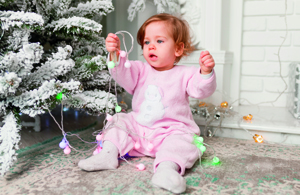Keeping your family safe in the bustling holiday season
12/5/2022 by Paige Partain, M.D.

The glitter, magic, gifts and celebrations of the holidays fill children with excitement and wonder. But the season also comes with risks.
Check out these tips to ensure your holidays are memorable, safe and healthy.
Trees and decorations
- If you have a real holiday tree, be sure the stand is always filled with water, so it doesn't dry out and pose a fire hazard. Artificial trees should be made from fire-retardant material. Tree stands should rest flat on the ground.
- Closely monitor children when they are assisting with decorations, especially when handling lighting, ornaments and breakable objects. Any decorations small enough to fit through a toilet paper tube can obstruct a small child's airway. Keep these ornaments higher on the tree so they are out of the reach of small hands.
- Holly berries, poinsettias and mistletoe are poisonous when eaten. Keep them away from kids and pets.
Lights and candles
- Buy decorative lights with the UL mark, which certifies they've been tested to meet safety requirements.
- Use power strips with built-in circuit breakers. Avoid putting too many plugs into one electrical outlet.
- Keep cords out of the way or behind furniture, and insert outlet covers into any unused outlets.
- Kids and fire don't mix. Don't leave them alone in a room with lighted candles, matches, lighters, traditional or gas fireplaces, or any other flame or heat source.
Food safety
- Many holiday traditions include special treats, foods and gatherings for meals. When you are preparing food for others, remember to wash your hands frequently — both before and during food preparation — and thoroughly cook all raw meats and wash raw vegetables to reduce the risk of foodborne illness.
- For more holiday food safety recommendations, check out these tips from the American Academy of Pediatrics.
Toys and games
- Choose age-appropriate toys and games. Be aware of hazardous toys. For younger kids, watch out for strings, long handles and small parts that can be removed. For older kids, be sure the parental controls are enabled for internet-capable devices.
- Avoid projectiles, such as guns or darts.
- Batteries shaped like disks, also known as button batteries, are tempting to small children. Check that batteries can't be easily removed. If you're worried your child may have eaten a button battery, seek immediate medical attention.
Winter fun
- Dress kids for the weather, making sure their hands, feet and heads are covered. Utilize layers for extra warmth.
- When exposed to cold, be wary of a tingling sensation or loss of sensation in an extremity. This might be an early sign of frostbite, which is also referred to as frostnip. At temperatures below zero, frostbite can occur in as little as five to 30 minutes, depending on weather conditions.
- Encourage children to wear the correct safety gear for sledding, skiing, snowboarding, ice skating and other outdoor activities. Parents need to wear safety gear, too.
- If traveling by car, don't buckle kids in while wearing winter coats. Instead, cover them with blankets and coats over the seat belt.
- Follow safe-sleep recommendations. For infants, use a crib with a tight-fitted sheet and avoid piling on blankets. Instead, layer their clothing and consider a sleep sack. For older children, avoid pajamas with strings, and be sure footie bottoms of a child's pajamas are nonskid.
Holidays, health and travel
No one wants to get sick or end up in quarantine over the holidays. Keep the whole family healthy by following these tips:
- Vaccinate all eligible family members for COVID-19. The primary COVID-19 vaccine series is now approved for all people beginning at 6 months old. Bivalent booster doses, to be given after the primary series, are now available for adults and children over 5. In addition to getting vaccinated for COVID-19, get vaccinated for flu, too.
- Avoid unnecessary travel if you are sick. Be tested for COVID-19 if you become sick before necessary travel. When traveling, consider wearing a mask in public. Check out the Centers for Disease Control and Prevention for more tips specific to travel in the era of the COVID-19 pandemic.
- Follow medication schedules and routines. Children should take their medications as prescribed by their health care clinician unless your clinician recommends a medication holiday.
Paige Partain, M.D., is a pediatrician in the Division of Community Pediatric and Adolescent Medicine at Mayo Clinic in Rochester. She practices at Mayo Family Clinic Northeast. Her areas of interest include preventive medicine and pediatric behavioral health, including attention-deficit/hyperactivity disorder, depression, anxiety and eating disorders.
